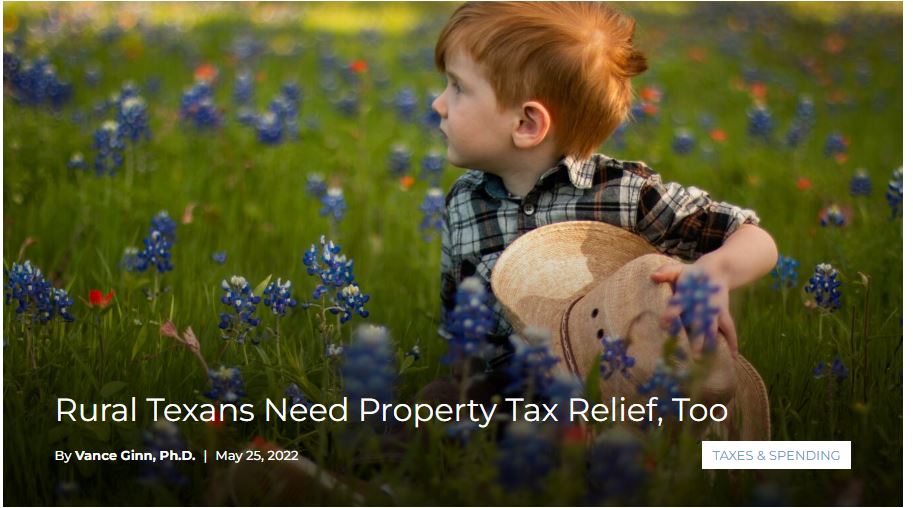|
High property taxes are not just an urban and suburban problem. In rural Hays County (San Marcos and surrounding), for example, property appraisals are shooting up.
“The overall market value of Hays County’s 2022 preliminary appraisal roll rose to nearly $59 billion, up 53.27% from $38.4 billion in 2021,” the Hays Free Press reports. “Commercial and industrial real property increased in value nearly 41%, up from nearly $3.6 billion in 2021 to $5 billion this year.” One year. And that burden will have to be shouldered by rural Texans who tend to be older and have less income than their urban counterparts. Yet opponents of property tax reform will use rural Texans as a prop in their argument. But rural Texans need property tax relief, too. And our plan, which will use state surplus funds to buy down the maintenance and operations (M&O) portion of school taxes (the biggest part of your tax bill), will benefit all property owners in every part of the state. The Foundation’s Lower Taxes, Better Texas plan provides a practical way to achieve this goal while funding critical government provisions. Some have expressed concern that rural counties won’t be able to pay for their first responders—police and firefighters. But the fact is, our plan is revenue-neutral and would continue to fund critical government services. It would allow for budgets to grow, but would limit increases in spending to no more than the rate of population growth plus inflation—anything more than that is just growing government. Yet within that framework, both schools and local governments would be fully funded. In fact, if cities, counties and special districts use the same formula (population growth plus inflation) to keep their spending in check, they can use surplus revenues to buy down their own property tax rates. Sales taxes are also a key part of our longer-term plan. Some have worried that rural Texas, with its more limited sales tax base, would suffer under our plan to broaden the sales tax to completely eliminate school district M&O property taxes within 10 years. But that’s not the case. Local governments (i.e. cities, counties, and special purpose districts) would have the option to raise their sales tax rate along with the increased funding from the broader base to eliminate their own M&O property taxes. If they don’t do this because they don’t have a sufficiently large sales tax base, then they have the flexibility to not eliminate their M&O property taxes but rather buy them down over time. There are also concerns that if the economy takes a hit, the state’s general revenues will decline, forcing higher school district M&O property tax rates in response. But our plan would have the state lower school district M&O property taxes only if there is a sufficient general revenue surplus while making permanent past reductions. There looks to be at least a $12 billion available in general revenue surplus at the end of the current budget period for this property tax relief. If there is a major recession, then the state could call on state agencies to find savings to soften the blow. That has been done before. And the state could turn to the at least $12 billion in the state’s rainy day fund created to cover unforeseen revenue shortfalls. And school districts are sitting on about $20 billion in excess reserves. That could also help them get through a tough recession. Property taxes are a major problem for rural Texans, whose budgets are already hurting from high gasoline prices (they drive longer distances), high food prices, and general inflation. Don’t use rural Texans to argue against the relief they need. https://www.texaspolicy.com/rural-texans-need-property-tax-relief-too/ Comments are closed.
|
Vance Ginn, Ph.D.
|


 RSS Feed
RSS Feed